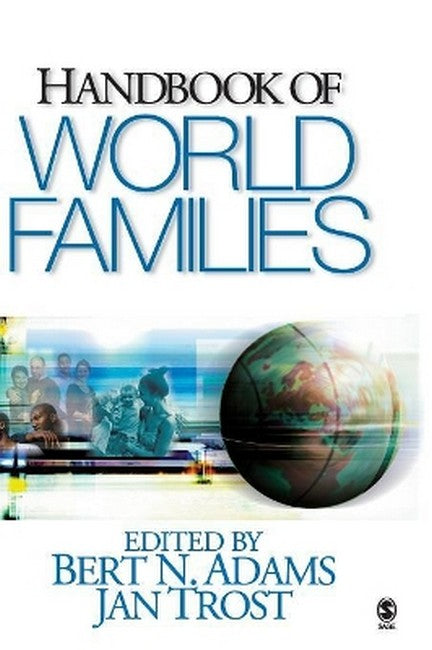Bert N. Adams (Ph.D., University of North Carolina) is Emeritus Professor of Sociology at the University of Wisconsin at Madison. He is a former President and currently a Fellow of the National Council on Family Relations. He has taught sociological theory extensively, both in East Africa and at the University of Wisconsin, and also teaches and writes on the sociology of the family. He is the author of several books, including the introductory textbook THE FAMILY: A SOCIOLOGICAL INTERPRETATION, 5TH EDITION (Harcourt Brace 1995) and SOCIOLOGICAL THEORY (Pine Forge Press 2001). With David M. Klein, he served as co-editor of the Understanding Families Series with Sage, which produced 20 books between 1995 and 2002. He is well connected with family sociologists throughout the world. Jan Trost is Professor of Sociology at the University of Uppsala in Uppsala, Sweden. He is a former President of the International Sociological Association (ISA) and Honorary Chair of the Committee on Family Research of the ISA. He is the author of several books and numerous journal articles and travels frequently to maintain professional contacts and collaborations throughout the world.
Request Academic Copy
Please copy the ISBN for submitting review copy form
Description
Introduction - Bert N. Adams and Jan Trost Part I: Africa 1. Families in Kenya - Edward K. Mburugu and Bert N. Adams 2. Nigerian Families - Innocent Victor Ogo Modo 3. Families in South Africa - Susan C. Ziehl Part II: Asia and the South Pacific 4. Australian Families - David de Vaus 5. Chinese Families - Xuewen Sheng 6. The Contemporary Indian Family - J. P. Singh 7. South Korean Families - Kwang-Kyu Lee 8. Taiwan's Families - Yu-Hua Chen and Chin-Chun Yi Part III: Europe 9. Families in Austria - Rudolf Richter and Sandra Kytir 10. Belgium's Families - Wilfried Dumon 11. The Czech Family - Ivo Mozny and Tomas Katrnak 12. Finland's Families - Hannele Forsberg 13. Families in Germany - Thomas Klein and Bernhard Nauck 14. Families in Hungary - Olga Toth and Peter Somlai 15. The Family in Portugal: Past and Present - Fausto Amaro 16. Scandinavian Families - Jan Trost and Irene Levin 17. Families in Turkey - Bernhard Nauck and Daniela Klaus Part IV: Latin America 18. The Family in Argentina: Modernity, Economic Crisis, and Politics - Elizabeth Jelin 19. Families in Cuba: From Colonialism to Revolution - Anne R. Roschelle, Maura I. Toro-Morn, and Elisa Facio 20. The Family in Puerto Rico: Colonialism, Industrialization, and Migration - Maura I. Toro-Morn Part V: The Middle East 21. Families in Iran: The Contemporary Situation - Taghi Azadarmaki 22. Families in Israel - Ruth Katz and Yoav Lavee 23. Kuwait's Families - Fahad Al Naser Part VI: North America 24. Families in Canada - Carol D. H. Harvey 25. U.S. Families - Barbara H. Settles Epilogue Name Index Subject Index About the Editors About the Contributors
"In the Handbook of World Families, Bert Adams and Jan Trost, two of the leading scholars in the field of comparative family studies, have masterfully edited a book that comparatively examines families from 25 nations located around the world. The chapter contributors have both theoretical and research knowledge as well as lived experiences of respective nation's families. The result is a well written, highly informed, and authoritative handbook that investigates an extensive range of family issues from local, national, and global perspectives. This book will be of vital interest for academics, students, family practitioners, and professionals, as well as for all those who wish to study and understand families in the contemporary world that is undergoing so much change." -- Mark Hutter "Bert Adams and Jan Trost have conducted an extensive and impressive co-ordination project, bringing together authors from 25 countries to write about family life in six major regions of the world. At a time when we are moving more and more toward a global village, this ambitious book provides evidence of world-wide trends in families and family relations. It also illustrates the resilience of local cultures, seen in variations among nations in trends and responses to them. This is a very useful resource for obtaining the kind of baseline information that is essential to comparative work.As well, a number of chapters contribute to our understanding of the complexities and politics of family life, starting with what is meant by family. This book will educate many about other parts of the world and the central place of families in them." -- Ingrid Arnet Connidis

